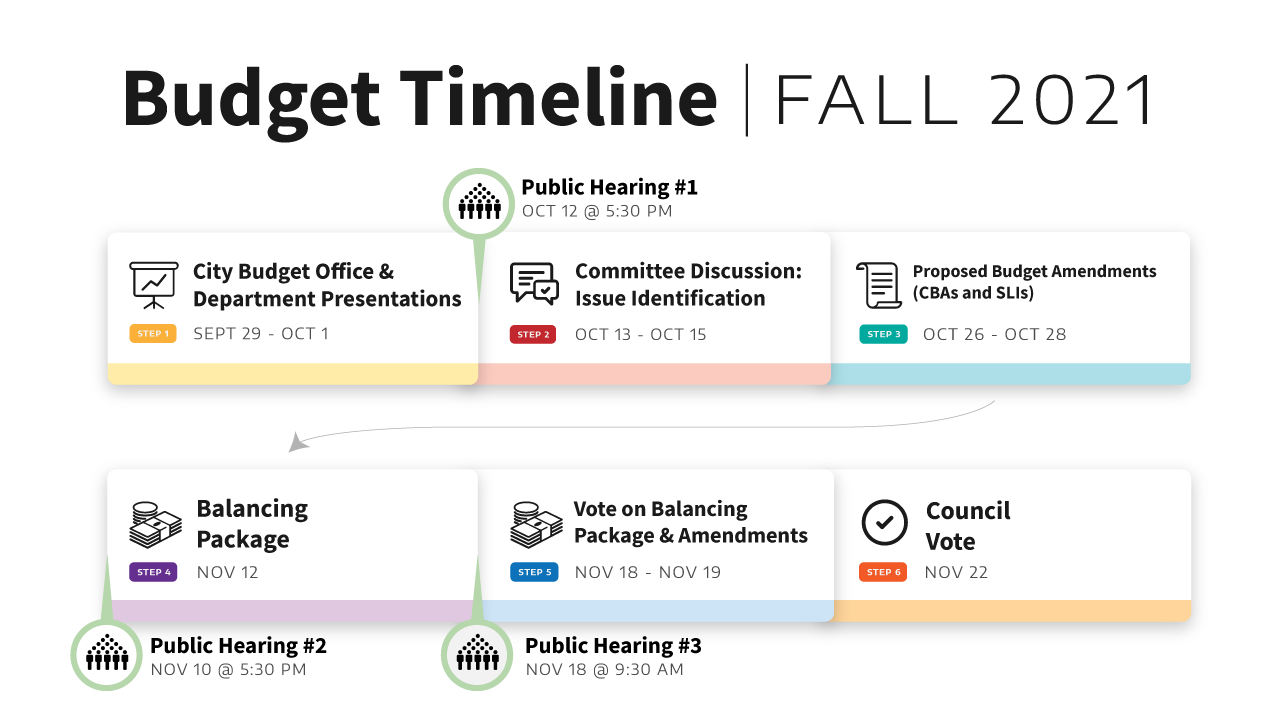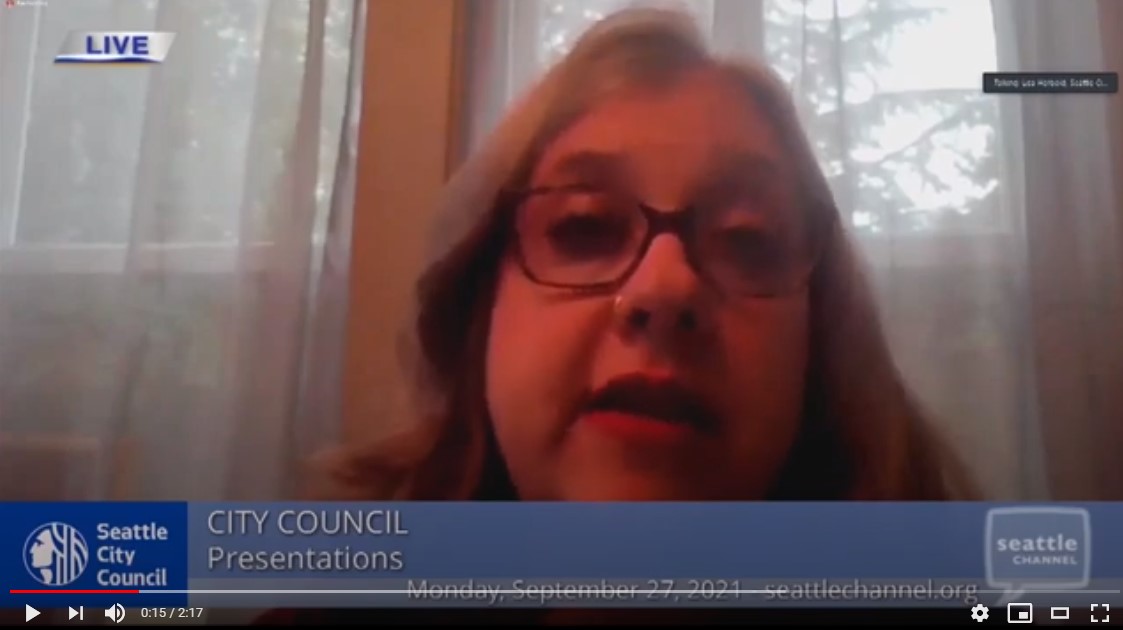This Week in the 2022 Budget; Diaper Need Awareness Week Proclamation; Boosters, Vaccines, and Avoiding Overflowing Hospitals; Seattle Municipal Court Audit
This Week in the 2022 Budget
On Monday the Mayor, as required by state law, sent a Proposed 2022 budget to the City Council, as well as a Proposed 2022-2027 Capital Improvement Program. Both links allow you to download the entire proposal, or to select a specific department.
The Council’s review of the proposed budget began this week, with an overview from the City Budget Office, and a round of Department Presentations.
Below are links to the presentations heard in the Select Budget Committee this week:
September 29:
- Introduction and Budget Process Overview
- City Budget Office Proposed Budget Overview
- Office of Economic Development
- Office of Sustainability and Environment
- Education and Early Learning
September 30:
- Office of Housing
- Citywide Homelessness Response
- Community Safety & Community Led Investments
- Seattle Police Department
October 1:
- Human Services Department
- Office of Planning and Community Development
- Seattle Department of Transportation
- Parks and Recreation
- COVID Response and Recovery
No meetings are scheduled for next week, as Council offices and Central Staff will be reviewing the proposal. The next scheduled meeting of the Select Budget Committee will a Public Hearing on October 12 at 5:30 p.m.
The budget meeting schedule is available at the Select Budget Committee webpage. You can download the budget calendar here.
Budget Committee meetings have public comment for 30 minutes at the beginning of the morning session. You can sign up to speak at the link.
Diaper Need Awareness Week Proclamation
On Monday, Council President González and I presented a Diaper Need Awareness Week proclamation to District 1 treasure Westside Baby as part of the national effort to recognize the growing number of families who struggle to secure enough diapers to keep their babies healthy. Our community is lucky to have Westside Baby step up to address this need during the pandemic, distributing 860,000 more diapers last year than the year previous.
Diaper need is a growing health issue that affects 1 in 3 families in the United States. Low-income families pay up to 14% of their entire income just for disposable diapers. Here in Seattle, diaper need impacts BIPOC families particularly hard, with 42 percent of Seattle’s BIPOC families struggling to afford diapers.
National research shows that diaper need is linked to higher rates of depressive symptoms in new moms than hunger is. It is also linked to more frequent visits to the pediatrician for diaper rash and urinary tract infections.
A diaper drive is a great way to show support during Diaper Need Awareness Week, and I encourage everyone to consider hosting or contributing to a diaper drive. You can learn more about meeting diaper need at westsidebaby.org.
Boosters, Vaccines, and Avoiding Overflowing Hospitals
Are you eligible for a booster? The CDC recommends booster doses of Pfizer vaccine for people who have completed two doses of Pfizer at least 6 months ago and are:
- 65 years or older
- Residents in long-term care facilities
- 50-64 years who are at high-risk because of underlying medical conditions
The following people may also receive a booster shot of Pfizer vaccine at least 6 months after receiving two doses of Pfizer vaccine based on their individual benefits and risks:
- 18-49 years who are at high-risk because of underlying medical conditions.
- 18-64 years in occupational or institutional settings that put them at high risk for COVID-19
Only booster doses of Pfizer COVID-19 vaccine have authorized by the FDA at this time. Booster doses of Moderna and Johnson & Johnson vaccines have not yet been authorized.
Note: Third doses of Moderna have been authorized only for people who have significantly compromised immune systems, such as those receiving cancer treatments or organ transplants.
I’m working with the Mayor’s Office and community partners in District 1 to find a host for a temporary, City-run booster clinic, expected to open in October. This effort likely won’t be as large as the former vaccination clinic at the SW Athletic Complex, but I’m glad that District 1 residents will benefit from easy availability of booster shots.
Hospital capacity is becoming a problem statewide. Getting vaxed and boosted has never been more important, as our hospitals across the state are inundated with Covid cases, the overwhelming majority of which are among folks who aren’t yet vaccinated. As reported by the Seattle Times, spikes of Covid in rural communities with low vaccination levels are overwhelming their local medical facilities, “forcing the transfer of hundreds of patients to King County hospitals to manage the load.”
The surge is so acute that Governor Inslee has requested healthcare help from the other Washington, asking for federal staff, including both clinical and non-clinical staff, to support the Washington health care system in response to rising COVID-19 hospitalizations.
What if I’m not Covid vaccinated yet? Now’s the right time, since many activities in King County will start requiring proof of vaccination at the end of October. Luckily, COVID-19 vaccine is always free. Everyone ages 12 and older can get a vaccine. Ages 12-17 can get Pfizer ONLY, while ages 18+ can get Pfizer, Moderna or J&J. Learn more about vaccination for youth at kingcounty.gov/vaccine/youth
No appointment needed: most pharmacies, clinics, and Public Health centers now offer drop-in COVID-19 vaccination. Enter your zip code in Washington’s Vaccine Locator tool or check Public Health’s Getting Vaccinated page to find a vaccination site near you.
Seattle Municipal Court Audit
The Seattle Municipal Court (SMC) hears prosecution of all misdemeanor and gross misdemeanor crimes, civil infractions, and other offenses authorized under the Seattle Municipal Code and certain Revised Code of Washington Statutes. The Court is made up of seven elected judges and five appointed magistrates.
The Auditor’s office conducted an audit, at the Council’s request, on the SMC’s probation program on the impacts of probation on people of color and the racial proportionality of imposing probation, conditions of compliance, and rates of successful completion and early release.
On September 23, the Auditor released their report which includes 14 recommendations (see appendix B for the full list). The executive summary of the report notes:
“While we found racial and ethnic disproportionality in the composition of SMC’s 2017-2019 probation population and other aspects of SMC’s probation program, we also saw SMC make progress towards addressing recommendations in the Court initiated Vera Institute of Justice June 2020 probation study and issues our office identified during this audit. However, we also found more work can be done to address racial and ethnic disproportionality in probation. Our review of probation data revealed that Blacks/African Americans are particularly overrepresented in the most intrusive forms of probation supervision monitoring, are underrepresented in successful probation outcomes, and tend to have cases that remain open rather than being closed after obligations are met. In reviewing the impacts of probation on people of color, we found that SMC’s efforts to promote equity within its probation system were hampered by data gaps, and a lack of performance outcomes, accurate accounting of fines and fees, and internal controls. We found SMC did not adhere to some internal and external policies, procedures, and requirements that can affect successful probation outcomes, particularly for people of color.”
The SMC responded to the report which is included as appendix A. Of note, the SMC is in the process of updating their 30-year-old technology for case management, the new system is scheduled to be fully implemented in the summer of 2022.
This work continues to build on the Vera Institute of Justice’s report which was issued in June 2020. I last wrote about this here. In 2020, SMC redesigned its Programs and Services division, including Probation Services, in response to stakeholder feedback, a desire to decrease disproportionate impacts to court clients, and the Vera Report recommendations. Seattle Municipal Court reports the following changes:
- Discontinued records checks, except in cases where records monitoring is required by statute. As of early 2021, SMC had reduced records checks by 78% resulting in 1,640 less clients on SMC probation.
- Focused Probation Services on high-risk case types, which has reduced clients on active supervision by 16%.
- Eliminated discretionary supervision fees imposed in criminal cases including all probation-related fees.
- Incentivized early release from probation by utilizing a goal-based approach to supervision. Newly published key performance indicators suggest a decrease in the average length of supervision to 18.7 months.
- Implemented a new case closure policy where counselors administratively close cases when clients have completed their goals.
- Implemented a probation client bill of rights and grievance process and began collecting client feedback as they exit probation. Initial results show 78% of clients completing the survey feel supported, encouraged, and motivated by their probation counselor.
- Began collecting self-reported race and ethnicity data through a new probation intake process.
I’ll be working during this budget session to ensure that we continue to make progress on the Vera report recommendations as well as the recommendations from the City Auditor.
Posted: October 1st, 2021 under Councilmember Herbold, COVID-19, Homelessness, Parks and Recreation, Proclamations, Public Health






